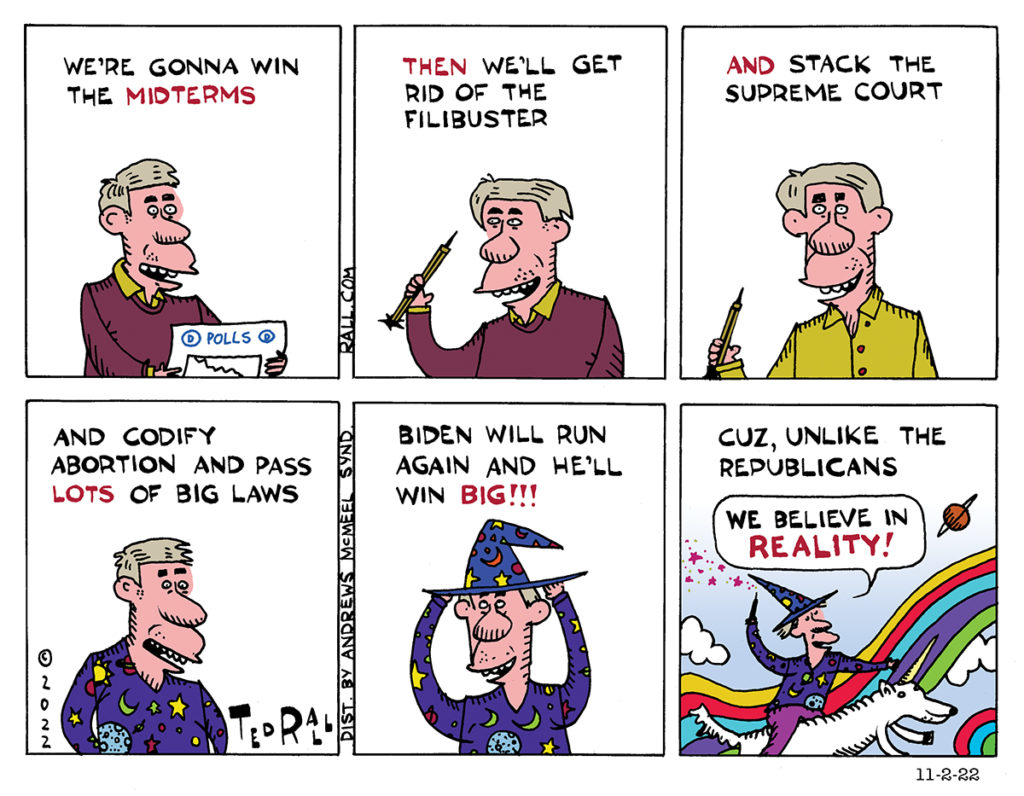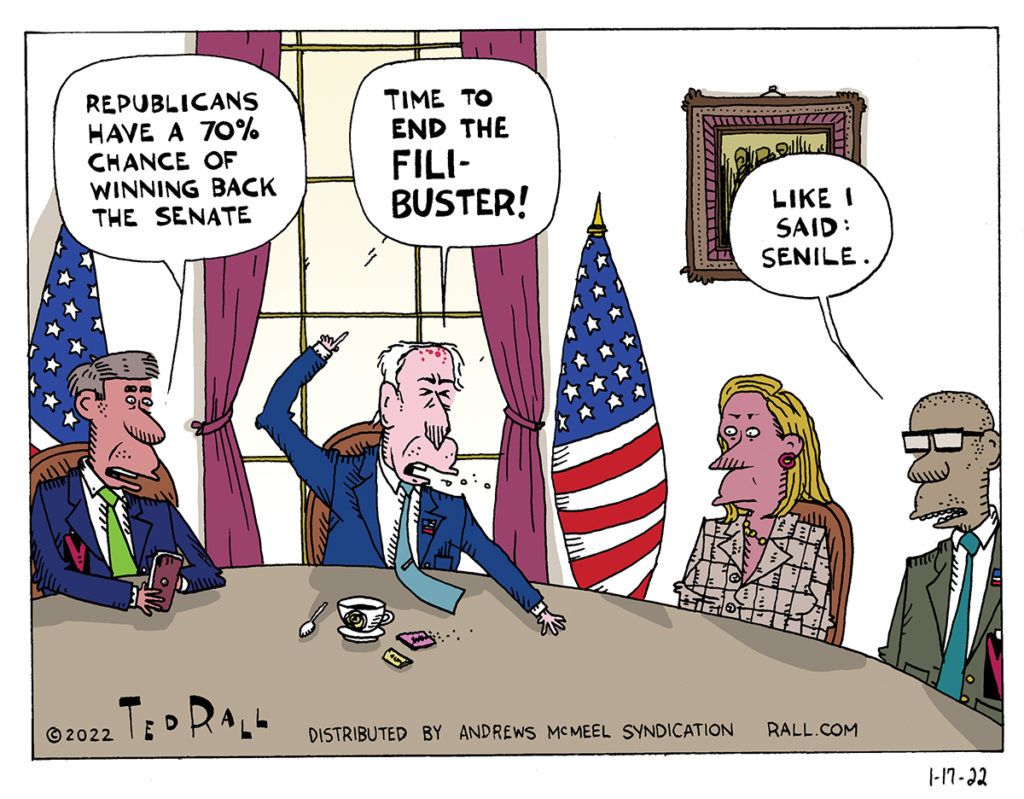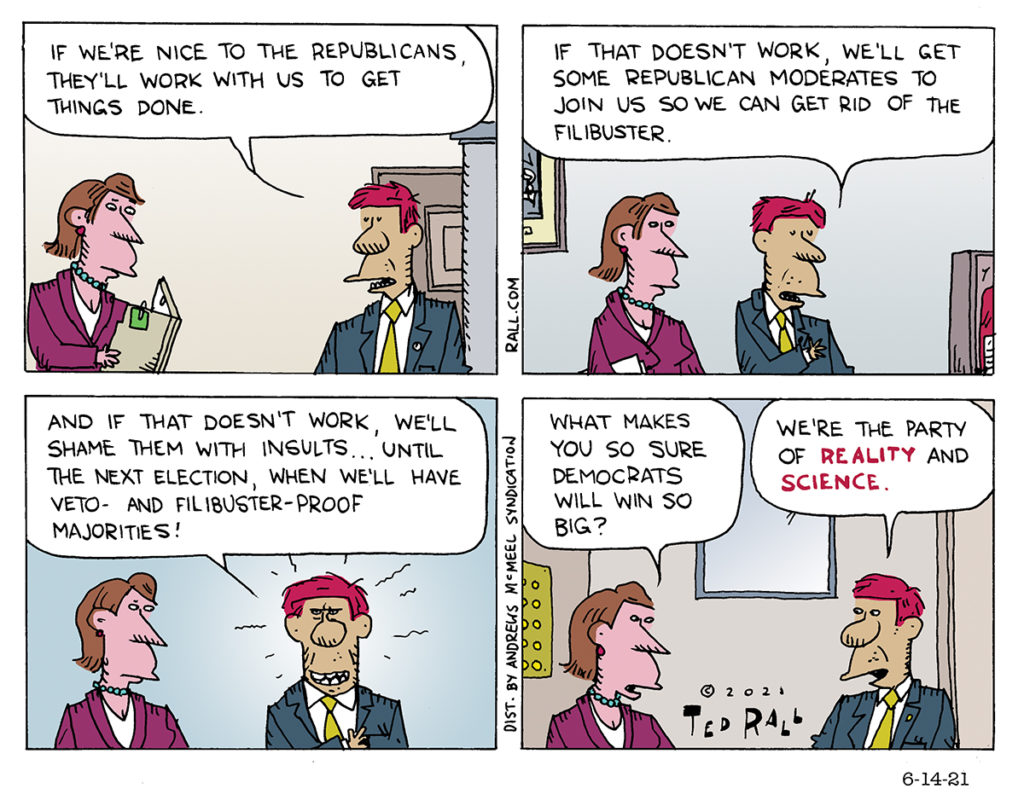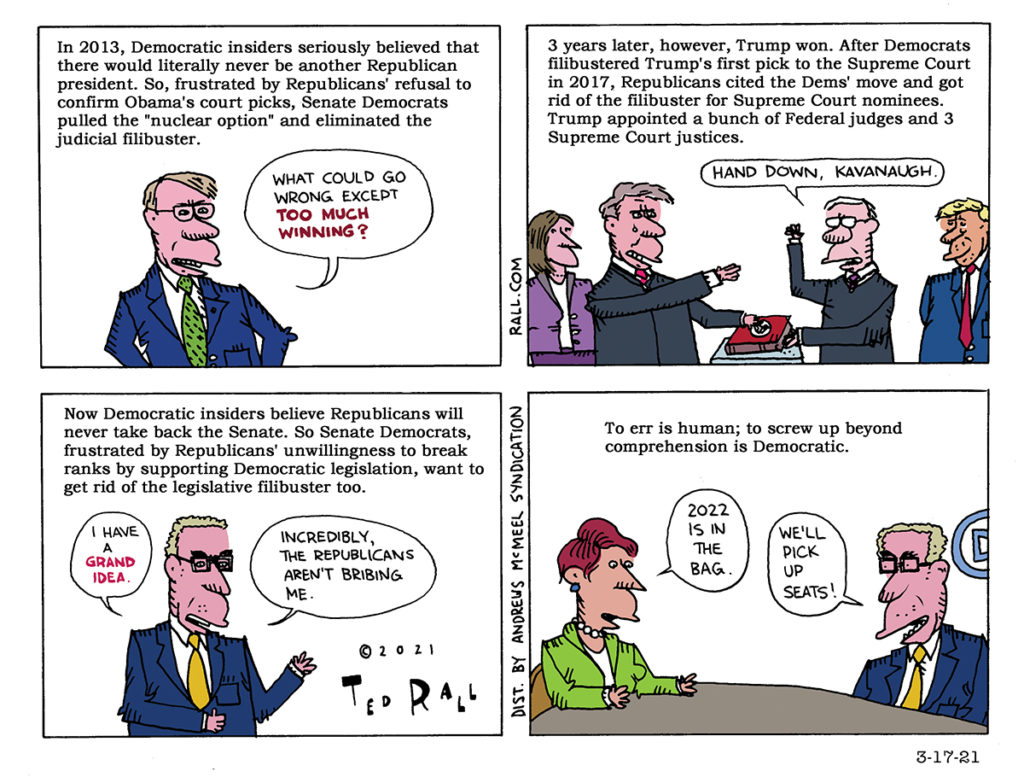Democrats complain that Republicans don’t live in the reality based world on issues like climate science, vaccines and economics. But they engage a lot in magical thinking as well. In the run up to the 2022 midterm elections in particular, the dream of things that they have to know will and can never happen.
SYNDICATED COLUMN: Men of Dishonor
A Congress of 21st Century Cynics Dodges 19th Century Rules
People are calling the recently adjourned 112th Congress “the most dysfunctional ever” and the least productive since the infamous “do-nothing Congress” of the 1940s. There’s lots of blame to go around, but one cause for congressional gridlock has gone unnoticed and unremarked upon: we no longer have a sense of honor.
Back in the late 18th and 19th centuries, when our bicameral legislature and its rules were conceived of by a bunch of land-owning white males, a gentleman’s word was his most precious asset. Integrity and the lack thereof were literally a matter of life and death; consider the matter of Alexander Hamilton and Aaron Burr. As Thomas Jefferson and his de facto wife Sally Hemings could attest, civility was far from guaranteed under this old system. It certainly could have worked better for Charles Sumner, the abolitionist Massachusetts senator who was nearly beaten to death by a proslavery colleague on the floor of the Senate in 1856. (He was avenging what he considered libelous rhetoric against his family.)
Though less-than-perfect, there was a lot to be said for a culture in which a person’s word was his bond, legalistic quibbling was scorned, and a legislator was expected to stake out and defend a principled position, even in the face of political and personal adversity.
It’s hard to imagine the “fiscal cliff” showdown unfolding in the 1800s or even the first half of the 1900s for two simple reasons. First, the general fiscal health of the country would have come ahead of partisanship. Second, and more importantly, members of the two political parties would have stuck to the deal that they struck a decade earlier. When George W. Bush and his Republicans pushed for a set of income tax cuts that primarily benefited the wealthiest Americans in 2001, they argued the standard GOP trickle-down economics talking point that the tax cuts would pay for themselves by stimulating the economy so much that revenues into government coffers would more than make up for the cost. In order to get enough Democratic support for passage, the Republicans agreed to a five-year time period, after which taxes would revert to their Bill Clinton-era levels.
By 2006 there was still no evidence to show that the tax cuts had stimulated the economy. In fact, by many measures, things were worse. The housing bubble was beginning to burst; unemployment and underemployment had increased. If this had been the 19th century, Republican legislators would have acknowledged that their experiment had failed and that would have been that. A gentleman didn’t run away from the facts or his mistakes.
Voters seemed to agree. Unhappy with the invasion of Iraq as well as the state of the economy, Americans returned Democrats to control of Congress in 2006. Republicans had a pretty good idea—the polls were damning—that their unpopular policies were driving them toward a decisive defeat in the midterm elections. For men and women of honor, this would have been a time to reassess and back off.
Nevertheless the GOP jammed through an extension of the 2001 Bush tax cuts for the wealthy months before the midterm election. No honor there.
Here we are nearly 12 years later, and the verdict is in: the Bush tax cuts failed miserably. No doubt about it, it’s absolutely ridiculous that President Obama and the Democrats agreed to extend them for all but the richest one-half of one percent of American income earners. But the debate should never have gotten this far in the first place. Had the Republicans who proposed it in the first place possessed an iota of good old-fashioned 19th-century honor and integrity, this misbegotten legislative abortion would have died in 2006.
Robert’s Rules of Order and other quaint traditions of parliamentary procedure don’t translate to a quibbling little time like ours, when White House lawyers torture widely understood words like “torture” and “soldier” or claim that a US military base in Cuba is in no man’s land, neither in Cuba nor under US control, and that members of both major political parties say anything in order to get their way. Consider, for example, the current push to reform the filibuster, in order to clear the logjam on judicial nominations and other business that used to be considered routine.
The Senate, the only house of Congress that permits a filibuster, draws upon a tradition of principled minority protest that goes back to Cato in ancient Rome. Until the 1970s, filibusters were a rarity, averaging one a year. Senators viewed them as a bit of a nuclear option and only considered deploying a one-man block on debate of a bill a few times during a long political career, to take a stand on an issue where he felt it mattered most. Now the filibuster is not only a daily routine but gets deployed in an automated way so that the Senate has effectively become a body in which nothing gets done without a 60% vote in favor.
Everyone in the Senate understood what filibusters were for. No one abused them. It was a matter of honor.
But honor is too much to ask when even the most basic of all political considerations—ideology and party affiliation—bend like a reed in the winds of change.
Last week the Republican governor of New Jersey and a Republican congressman from Long Island, New York were so incensed by their party’s refusal to approve disaster relief funds for their states after hurricane Sandy that they went public with disparaging remarks about the Republican leadership in Congress. Fair enough. Standing up for your constituents against rank parochial self-interest is what integrity is all about.
On the other hand, the immediate willingness of some so-called liberal and progressive Democrats to welcome Chris Christie—a Tea Party favorite—and Peter King—a notorious nativist and anti-Muslim bigot—into their party’s ranks indicates a willingness to overlook basic principles that would have startled most self-described gentlemen of a century or two ago, much less those who’d entered public service. Back then, of course, the American political party system wasn’t as settled as it is today, so there were mass changes of party affiliation as parties appeared, metastasized and vanished. Still, it wasn’t acceptable behavior to change parties over a minor spat like the hurricane aid or for a party to accept members who didn’t adhere to its principles.
It’s almost enough to make you wish for a duel.
(Ted Rall is the author of “The Book of Obama: How We Went From Hope and Change to the Age of Revolt.” His website is tedrall.com.)
COPYRIGHT 2013 TED RALL
SYNDICATED COLUMN: A President Who Doesn’t Even Try
Is Obama Kowtowing to the Right? Or Is He One of Them?
The President’s progressive critics blame him for continuing and expanding upon his Republican predecessor’s policies. His supporters point to the obstructionist, Republican-controlled Congress. What can Obama do? He’s being stymied at every turn.
The first problem with the it’s-the-GOP’s-fault defense is that it asks voters to suffer short-term memory loss. In 2009, you probably recall, Democrats controlled both houses of Congress. By a sizeable majority. They even had a filibuster-proof 60-seat majority in the Senate. His approval ratings were through the roof; even many Republicans who had voted against him took a liking to him. The media, in his pocket, wondered aloud whether the Republican Party could ever recover. “Rarely, if ever, has a President entered office with so much political wind at his back,” Tim Carney wrote for the Evans-Novak Political Report shortly after the inauguration.
If Obama had wanted to pursue a progressive agenda—banning foreclosures, jailing bankers, closing Guantánamo, stopping the wars, pushing for the public option he promised in his healthcare plan—he could have. He had ample political capital, yet chose not to spend it.
Now that Congress is controlled by a Republican Party in thrall to its radical-right Tea Party faction, it is indeed true that Obama can’t get routine judicial appointments approved, much less navigate the passage of legislation. Oh-so-conveniently, Obama has turned into a liberal-come-lately. Where was his proposed Buffett Rule (which would require millionaires with huge investment income to pay the same percentage rate as middle-class families) in 2009, when it might have stood a chance of passage?
Team Obama’s attempt to shore up his liberal base also falls short on the facts. Progressives were shocked by the U.S. Supreme Court’s 5-4 ruling, along party lines, that legalized strip-searches and body cavity rapes by police and private security firms who detain people suspected of any crime, even minor traffic infractions.
“What virtually none of this…commentary mentioned,” reported Glenn Greenwald in Salon, “was that that the Obama DOJ [Department of Justice] formally urged Court to reach the conclusion it reached…this is yet another case, in a long line, where the Obama administration was able to have its preferred policies judicially endorsed by getting right-wing judges to embrace them.”
No wonder Obama stayed mum.
Which brings us to the biggest, yet least discussed, flaw in the attempt to pin Obama’s inaction on the heads of Congressional Republicans: the bully pulpit.
Whether Donald Trump likes it or not, Barack Obama is still president. If he calls a press conference to call attention to an issue, odds are that reporters will show up. But he’s not walking tall or even talking big.
Responding to fall 2011 polls that indicated softening support among the younger and more liberal voters who form the Democratic base, Obama’s reelection strategists began rolling out speeches inflected with Occupy-inspired rhetoric about class warfare and trying to make sure all Americans “get a fair shot.” But that’s all it is: talk. And small talk at that.
Instead of introducing major legislation, the White House plans to spend 2012 issuing presidential orders about symbolic, minor issues.
Repeating Clinton-era triangulation and micro-mini issues doesn’t look like a smart reelection strategy. The Associated Press reported: “Obama’s election year retreat from legislative fights means this term will end without significant progress on two of his 2008 campaign promises: comprehensive immigration reform and closing the military prison for terrorist suspects at Guantánamo Bay, Cuba. Piecemeal presidential directives are unlikely to make a sizeable dent in the nation’s 8.6 percent unemployment rate or lead to significant improvements in the economy, the top concern for many voters and the issue on which Republican candidates are most likely to criticize Obama. In focusing on small-bore executive actions rather than ambitious legislation, the president risks appearing to be putting election-year strategy ahead of economic action at a time when millions of Americans are still out of work.”
Of course, Obama may prevail. Romney is an extraordinarily weak opponent.
For progressives and leftists, however, the main point is that Obama never tries to move the mainstream of ideological discourse to the left.
Obama has been mostly silent on the biggest issue of our time, income inequality and the rapid growth of the American underclass. He hasn’t said much about the environment or climate change, the most serious problem we face—and one for which the U.S. bears a disproportionate share of the blame. Even on issues where he was blocked by Congress, such as when Republicans prohibited the use of public funds to transport Gitmo detainees to the U.S. for trials, he zipped his lips.
It isn’t hard to imagine a president launching media-friendly crusades against poverty or global warming. FDR and LBJ did it, touring the country, appointing high-profile commissions and inviting prominent guests to the White House to draw attention to issues they cared about.
In 2010, Venezuelan President Hugo Chávez invited flood victims to move into his presidential palace. Seven years after Katrina, Gulf Coast residents are still waiting for help. What if Obama opened up the Lincoln Bedroom to a homeless family? The media couldn’t ignore a PR stunt like that.
Obama has mostly shunned the time-honored strategy of trapping your opposition by forcing them vote against your popular ideas. In 2009, for example, it would have been smarter politics—and better governance—to push for real socialized medicine, or at least ObamaCare with the public option he promised. He would either have wound up with a dazzling triumph, or a glorious defeat.
Liberals don’t blame Obama for not winning. They blame him for not trying. When he does crazy things like authorizing the assassinations of U.S. citizens without trial, progressives have to ask themselves: Is this guy kowtowing to the Right? Or is he one of them?
(Ted Rall’s next book is “The Book of Obama: How We Went From Hope and Change to the Age of Revolt,” out May 22. His website is tedrall.com.)





